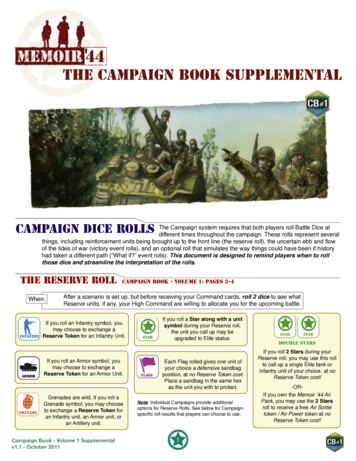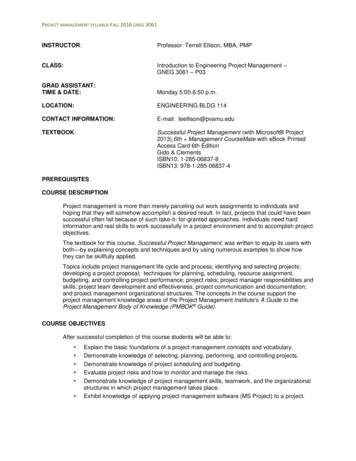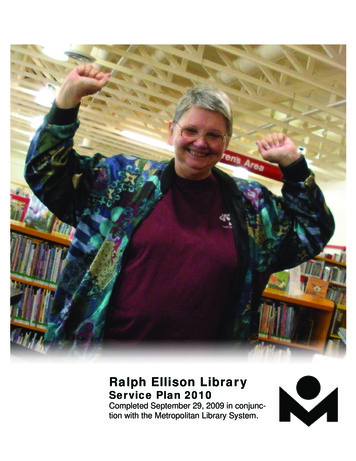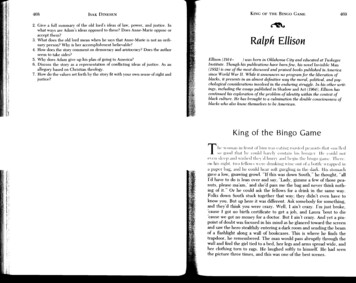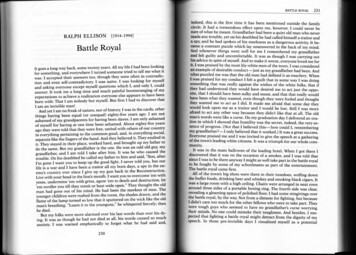
Transcription
BATTLE ROYALRALPH ELLISON[1914-1994]Battle RoyalIt goes a long way back, some twenty years. All my life I had been lookingfor something, and everywhere I turned someone tried to tell me what itwas. I accepted their answers too. though they were often in contradic tion and even self-contradictory. I was naive. I was looking for myselfand asking everyone except myself questions which I, and only I, couldanswer. It took me a long time and much painful boomerangmg of myexpectations to achieve a realization everyone else appears to have beenbom with: That I am nobody but myself. But first I had to discover thatI am an invisible man!And yet I am no freak of nature, nor of history. I was in the cards, otherthings having been equal (or unequal) eighty-five years ago. I am notashamed of my grandparents for having been slaves. I am only ashamedof myself for having at one time been ashamed. About eighty-five yearsago they were told that they were free, united with others of om countryin everything pertaining to the common good, and, in everything social,separate like the fingers of the hand. And they believed it. They exulted init. They stayed in their place, worked hard, and brought up my father todo the same. But my grandfather is the one. He was an odd old guy. mygrandfather, and I am told I take after him. It was he who caused etrouble. On his deathbed he called my father to him and said, “Son, afterI’m gone I want you to keep up the good fight. I never told you, but ourlife is a war and I have been a traitor all my bom days, a spy in the en emy’s country ever since I give up my gun back in the Reconstmction.Live with your head in the lion’s mouth. I want you to overcome ’em withyeses, undermine ’em with grins, agree ’em to death and destmction, let’em swoller you till they vomit or bust wide open.” They thought the oldman had gone out of his mind. He had been the meekest of men. Theyounger children were mshed from the room, the shades drawn, and theflame of the lamp turned so low that it sputtered on the wick like the oldman’s breathing. “Learn it to the younguns,” he whispered fiercely; thenhe died.,But my folks were more alarmed over his last words than over fits dy ing. It was as though he had not died at all, his words caused so muchanxiety. I was warned emphatically to forget what he had said and,230231indeed, this is the first time it has been mentioned outside the familycircle. It had a tremendous effect upon me, however. I could never besure of what he meant. Grandfather had been a quiet old man who nevermade any trouble, yet on his deathbed he had called himself a traitor and spy, and he had spoken of his meekness as a dangerous activity. It be came a constant puzzle which lay unanswered in the back of my mind.And whenever things went well for me I remembered my grandfatherand felt guilty and uncomfortable. It was as though I was carrying outhis advice in spite of myself. And to make it worse, everyone loved me forit. I was praised by the most lily-white men of the town. I was consideredan example of desirable conduct—just as my grandfather had been. Andwhat puzzled me was that the old man had defined it as treachery. WhenI was praised for my conduct I felt a guilt that in some way I was doingsomething that was really against the wishes of the white folks, that ifthey had understood they would have desired me to act just the oppo site, that I should have been sulky and mean, and that that really wouldhave been what they wanted, even though they were fooled and thoughtthey wanted me to act as I did. It made me afraid that some day theywould look upon me as a traitor and I would be lost. Still I was moreafraid to act any other way because they didn’t like that at all. The oldman’s words were like a curse. On my graduation day I delivered an ora tion in which I showed that humility was the secret, indeed, the very es sence of progress. (Not that I believed this—how could I, rememberingmy grandfather?—I only believed that it worked.) It was a great success.Everyone praised me and I was invited to give the speech at a gatheringof the town s leading white citizens. It was a triumph for our whole com munity.It was in the main ballroom of the leading hotel. When I got there Idiscovered that it was on the occasion of a smoker, and I was told thatsince I was to be there anyway I might as well take part in the battle royalto be fought by some of my schoolmates as part of the entertainment.The battle royal came first.All of the town’s big shots were there in their tuxedoes, wolfing downthe buffet foods, drinking beer and whiskey and smoking black cigars. Itwas a large room with a high ceiling. Chairs were arranged in neat rowsaround three sides of a portable boxing ring. The fourth side was clear,revealing a gleaming space of polished floor. I had some misgivings overthe battle royal, by the way. Not from a distaste for fighting, but becauseI didn’t care too much for the other fellows who were to take part. Theywere tough guys who seemed to have no grandfather’s curse worryingtheir minds. No one could mistake their toughness. And besides, I sus pected that fighting a battle royal might detract from the dignity of myspeech. In those pre-invisible days I visualized myself as a potential
232RALPH ELLISONBooker T. Washington. But the other fellows didn’t care too much forme either, and there were nine of them. I felt superior to them in my way,and I didn’t like the manner in which we were all crowded together intothe servants’ elevator. Nor did they like my being there. In fact, as thewarmly lighted floors flashed past the elevator we had words over thefact that I, by taking part in the fight, had knocked one of their friendsout of a night’s work.We were led out of the elevator through a rococo hall into an anteroomand told to get into our fighting togs. Each of us was issued a pair of box ing gloves and ushered out into the big mirrored hall, which we enteredlooking cautiously about us and whispering, lest we might accidentallybe heard above the noise of the room. It was foggy with cigar smoke.And already the whiskey was taking effect. I was shocked to see some ofthe most important men of the town quite tipsy. They were all therebankers, lawyers, judges, doctors, fire chiefs, teachers, merchants. Evenone of the more fashionable pastors. Something we could not see wasgoing on up front. A clarinet was vibrating sensuously and the men werestanding up and moving eagerly forward. We were a small tight group,clustered together, our bare upper bodies touching and shining with an ticipatory sweat: while up front the big shots were becoming increas ingly excited over something we still could not see. Suddenly I heard theschool superintendent, who had told me to come, yell, “Bring up theshines, gentlemen! Bring up the little shines!We were rushed up to the front of the ballroom, where it smelled evenmore strongly of tobacco and whiskey. Then we were pushed into place.I almost wet my pants. A sea of faces, some hostile, some amused, ringedaround us, and in the center, facing us, stood a magnificent blonde starknaked. There was dead silence. I felt a blast of cold air chill me. I tried toback away, but they were behind me and around me. Some of the boysstood with lowered heads, trembling. I felt a wave of irrational guilt andfear. My teeth chattered, my skin turned to goose flesh, my knees knocked.Yet I was strongly attracted and looked in spite of myself. Had the priceof looking been blindness, I would have looked. The hair was yellow likethat of a circus kewpie doll, the face heavily powdered and rouged, asthough to form an abstract mask, the eyes hollow and smeared a coolblue, the color of a baboon’s butt. I felt a desire to spit upon her as myeyes brushed slowly over her body. Her breasts were firm and round asthe domes of East Indian temples, and I stood so close as to see the fineskin texture and beads of pearly perspiration glistening like dew aroundBooker T. Washington (1856-1915): African American educator, reformer, and*political leader. He advocated education in industry and economic security for !post-Reconstruction African Americans.BATTLE ROYAL233the pink and erected buds of her nipples. I wanted at one and the sametime to run from the room, to sink through the floor, or go to her andcover her from my eyes and the eyes of the others with my body; to feelthe soft thighs, to caress her and destroy her, to love her and murder her,to hide from her, and yet to stroke where below the small American flagtattooed upon her belly her thighs formed a capital V. I had a notion thatof all in the room she saw only me with her impersonal eyes.And then she began to dance, a slow sensuous movement; the smokeof a hundred cigars clinging to her like the thinnest of veils. She seemedlike a fair bird-girl girdled in veils calling to me from the angry surface ofsome gray and threatening sea. I was transported. Then I became awareof the clarinet playing and the big shots yelling at us. Some threatened usif we looked and others if we did not. On my right I saw one boy faint.And now a man grabbed a silver pitcher from a table and stepped closeas he dashed ice water upon him and stood him up and forced two of usto support him as his head hung and moans issued from his thick bluishlips. Another boy began to plead to go home. He was the largest of thegroup, wearing dark red fighting trunks much too small to conceal theerection which projected from him as though in answer to the insinuat ing low-registered moaning of the clarinet. He tried to hide himself withhis boxing gloves.And all the while the blonde continued dancing, smiling faintly at thebig shots who watched her with fascination, and faintly smiling at ourfear. I noticed a certain merchant who followed her hungrily, his lips looseand drooling. He was a large man who wore diamond studs in a shirtfrontwhich swelled with the ample paunch underneath, and each time theblonde swayed her undulating hips he ran his hand through the thin hairof his bald head and, with his arms upheld, his posture clumsy like that ofan intoxicated panda, wound his belly in a slow and obscene grind. Thiscreature was completely hypnotized. The music had quickened. As thedancer flung herself about with a detached expression on her face, themen began reaching out to touch her. I could see their beefy fingers sinkinto her soft flesh. Some of the others tried to stop them and she began tomove around the floor in graceful circles, as they gave chase, slipping andsliding over the polished floor. It was mad. Chairs went crashing, drinkswere spilt, as they ran laughing and howling after her. They caught herjust as she reached a door, raised her from the floor, and tossed her as col lege boys are tossed at a hazing, and above her red fixed-smiling lips I sawthe terror and disgust in her eyes, almost like my own terror and thatwhich I saw in some of the other boys. As I watched, they tossed her twiceand her soft breasts seemed to flatten against the air and her legs flungwildly as she spun. Some of the more sober ones helped her to escape. AndI started off the floor, heading for the anteroom with the rest of the boys.
234RALPH ELLISONSome were still crying and in hysteria. But as we tried to leave we werestopped and ordered to get into the ring. There was nothing to do butwhat we were told. All ten of us climbed under the ropes and allowedourselves to be blindfolded with broad bands of white cloth. One of themen seemed to feel a bit sympathetic and tried to cheer us up as we stoodwith our backs against the ropes. Some of us tried to grin. “See that boyover there?” one of the men said. “I want you to run across at the bell andgive it to him right in the belly. If you don’t get him. I'm going to get you.I don’t like his looks.” Each of us was told the same. The blindfolds wereput on. Yet even then I had been going over my speech. In my mind eachword was as bright as flame. I felt the cloth pressed into place, andfrowned so that it would be loosened when I relaxed.But now I felt a sudden fit of blind terror. I was unused to darkness. Itwas as though I had suddenly found myself in a dark room filled withpoisonous cottonmouths. I could hear the bleary voices yelling insis tently for the battle royal to begin.“Get going in there!”“Let me at that big nigger!”I strained to pick up the school superintendent’s voice, as though tosqueeze some security out of that slightly more familiar sound.“Let me at those black sonsabitches!” someone yelled.“No, Jackson, no!” another voice yelled. "Here, somebody, help mehold Jack.”i. u »“I want to get at that ginger-colored nigger. Tear him limb from limb,the first voice yelled.I stood against the ropes trembling. For in those days I was what theycalled ginger-colored, and he sounded as though he might crunch mebetween his teeth like a crisp ginger cookie.Quite a struggle was going on. Chairs were being kicked about and Icould hear voices grunting as with a terrific effort. I wanted to see, to seemore desperately than ever before. But the blindfold was as tight as athick skin-puckering scab and when I raised my gloved hands to pushthe layers of white aside a voice yelled, “Oh, no you don’t, black bastard!Leave that alone!”"Ring the bell before Jackson kills him a coon!” someone boomed inthe sudden silence. And I heard the bell clang and the sound of the feetscuffling forward.A glove smacked against my head. I pivoted, striking out stiffly assomeone went past, and felt the jar ripple along the length of my arm tomy shoulder. Then it seemed as though all nine of the boys had turnedupon me at once. Blows pounded me from all sides while I struck out asbest I could. So many blows landed upon me that I wondered if I wereBATTLE ROYAL235not the only blindfolded fighter in the ring, or if the man called Jacksonhadn’t succeeded in getting me after all.Blindfolded, I could no longer control my motions. I had no dignity. Istumbled about like a baby or a drunken man. The smoke had becomethicker and with each new blow it seemed to sear and further restrict mylungs. My saliva became like hot bitter glue. A glove connected with myhead, filling my mouth with warm blood. It was eveiywhere. I could nottell if the moisture I felt upon my body was sweat or blood. A blow landedhard against the nape of my neck. I felt myself going over, my head hit ting the floor. Streaks of blue light filled the black world behind the blind fold. I lay prone, pretending that I was knocked out, but felt myself seizedby hands and yanked to my feet. “Get going, black boy! Mix it up!” Myarms were like lead, my head smarting from blows. I managed to feel myway to the ropes and held on, tiying to catch my breath. A glove landedin my midsection and I went over again, feeling as though the smoke hadbecome a knife jabbed into my guts. Pushed this way and that by the legsmilling around me, I finally pulled erect and discovered that I could seethe black, sweat-washed forms weaving in the smoky-blue atmospherelike drunken dancers weaving to the rapid drum-like thuds of blows.Eveiyone fought hysterically. It was complete anarchy. Eveiybodyfought eveiybody else. No group fought together for long. Two, three,four, fought one, then turned to fight each other, were themselves at tacked. Blows landed below the belt and in the kidney, with the glovesopen as well as closed, and with my eye partly opened now there was notso much terror. I moved carefully, avoiding blows, although not too manyto attract attention, fighting from group to group. The boys groped aboutlike blind, cautious crabs crouching to protect their mid-sections, theirheads pulled in short against their shoulders, their arms stretched ner vously before them, with their fists testing the smoke-filled air like theknobbed feelers of hypersensitive snails. In one comer I glimpsed a boyviolently punching the air and heard him scream in pain as he smashedhis hand against a ring post. For a second I saw him bent over holdinghis hand, then going down as a blow caught his unprotected head. Iplayed one group against the other, slipping in and throwing a punchthen stepping out of range while pushing the others into the melee totake the blows blindly aimed at me. The smoke was agonizing and therewere no rounds, no bells at three minute intervals to relieve our exhaus tion. The room spun round me, a swirl of lights, smoke, sweating bodiessurrounded by tense white faces. I bled from both nose and mouth, theblood spattering upon my chest.‘ The men kept yelling, “Slug him, black boy! Knock his guts out!”„i,"Uppercut him! Kill him! Kill that big boy!”
236RALPH ELLISONTaking a fake fall, I saw a boy going down heavily beside me as thoughwe were felled by a single blow, saw a sneaker-clad foot shoot into hisgroin as the two who had knocked him down stumbled upon him. Irolled out of range, feeling a twinge of nausea.The harder we fought the more threatening the men became. And yet,I had begun to worry about my speech again. How would it go? Wouldthey recognize my ability? What would they give me?I was fighting automatically and suddenly I noticed that one after an other of the boys was leaving the ring. I was surprised, filled with panic,as though I had been left alone with an unknown danger. Then I under stood. The boys had arranged it among themselves. It was the custom forthe two men left in the ring to slug it out for the winner’s prize. I discov ered this too late. When the bell sounded two men in tuxedoes leapedinto the ring and removed the blindfold. I found myself facing Tatlock,the biggest of the gang. I felt sick at my stomach. Hardly had the bellstopped ringing in my ears than it clanged again and I saw him movingswiftly toward me. Thinking of nothing else to do I hit him smash on thenose. He kept coming, bringing the rank shaip violence of stale sweat.His face was a black blank of a face, only his eyes alive—with hate of meand aglow with a feverish terror from what had happened to us all. Ibecame anxious. I wanted to deliver my speech and he came at me asthough he meant to beat it out of me. I smashed him again and again,taking his blows as they came. Then on a sudden impulse I struck himlightly and as we clinched, I whispered, “Fake like I knocked you out, youcan have the prize.”“I’ll break your behind," he whispered hoarsely."For them?”"For me, sonofabilch!"They were yelling for us to break it up and Tatlock spun me half aroundwith a blow, and as a joggled camera sweeps in a reeling scene, I saw thehowling red faces crouching tense beneath the cloud of blue-gray smoke.For a moment the world wavered, unraveled, flowed, then my headcleared and Tatlock bounced before me. That fluttering shadow beforemy eyes was his jabbing left hand. Then falling forward, my head againsthis damp shoulder, I whispered,"111 make it five dollars more.""Go to hell!”But his muscles relaxed a trifle beneath my pressure and I breathed,“Seven!”“Give it to your ma," he said, ripping me beneath the heart.And while I still held him I butted him and moved away. I felt myselfbombarded with punches. I fought back with hopeless desperation.I wanted to deliver my speech more than anything else in the world.BATTLE ROYAL237because I felt that only these men could judge truly my ability, and nowthis stupid clown was ruining my chances. I began fighting carefullynow, moving in to punch him and out again with my greater speed. Alucky blow to his chin and I had him going too—until I heard a loudvoice yell, “I got my money on the big boy."Hearing this, I almost dropped my guard. I was confused: Should I tryto win against the voice out there? Would not this go against my speech,and was not this a moment for humility, for nonresistance? A blow to myhead as I danced about sent my right eye popping like a jack-in-the-boxand settled my dilemma. The room went red as I fell. It was a dream fall,my body languid and fastidious as to where to land, until the floor be came impatient and smashed up to meet me. A moment later I came to.An hypnotic voice said FIVE emphatically. And I lay there, hazily watch ing a dark red spot of my own blood shaping itself into a butterfly, glis tening and soaking into the soiled gray world of the canvas.When the voice drawled TEN I was lifted up and dragged to a chair. Isat dazed. My eye pained and swelled with each throb of my poundingheart and I wondered if now I would be allowed to speak. I was wringingwet, my mouth still bleeding. We were grouped along the wall now. Theother boys ignored me as they congratulated Tatlock and speculated asto how much they would be paid. One boy whimpered over his smashedhand. Looking up front, I saw attendants in white jackets rolling theportable ring away and placing a small square rug in the vacant spacesurrounded by chairs. Perhaps, I thought, I will stand on the rug to de liver my speech.Then the M.C. called to us, "Come on up here boys and get yourmoney.”We ran forward to where the men laughed and talked in their chairs,waiting. Everyone seemed friendly now.“There it is on the rug," the man said. I saw the rug covered with coinsof all dimensions and a few crumpled bills. But what excited me, scat tered here and there, were the gold pieces.“Boys, it’s all yours," the man said. “You get all you grab."“That’s right, Sambo,” a blond man said, winking at me confidentially.I trembled with excitement, forgetting my pain. I would get the goldand the bills, I thought. I would use both hands. I would throw my bodyagainst the boys nearest me to block them from the gold."Get down around the rug now," the man commanded, “and don't any one touch it until I give the signal."“This ought to be good,” I heard.As told, we got around the square rug on our knees. Slowly the manraised his freckled hand as we followed it upward with our eyes.I heard, “These niggers look like they’re about to pray!”
BATTLE ROYAL238239RALPH ELLISONThen, “Ready," the man said. “Go!"I lunged for a yellow coin lying on the blue design of the carpet, touch ing it and sending a surprised shriek to join those rising around me. Itried frantically to remove my hand but could not let go. A hot, violentforce tore through my body, shaking me like a wet rat. The rug was elec trified. The hair bristled up on my head as I shook myself free. Mymuscles jumped, my nerves jangled, writhed. But I saw that this wasnot stopping the other boys. Laughing in fear and embarrassment, somewere holding back and scooping up the coins knocked off by the painfulcontortions of the others. The men roared above us as we struggled.“Pick it up, goddamnit, pick it up!" someone called like a bass-voicedparrot. “Go on, get it!”I crawled rapidly around the floor, picking up the coins, trying to avoidthe coppers and to get greenbacks and the gold. Ignoring the shock bylaughing, as I brushed the coins off quickly, I discovered that I couldcontain the electricity—a contradiction, but it works. Then the men be gan to push us onto the rug. Laughing embarrassedly, we struggled outof their hands and kept after the coins. We were all wet and slippery andhard to hold. Suddenly I saw a boy lifted into the air, glistening withsweat like a circus seal, and dropped, his wet back landing flush upon thecharged rug, heard him yell and saw him literally dance upon his back,his elbows beating a frenzied tattoo upon the floor, his muscles twitchinglike the flesh of a horse stung by many flies. When he finally rolled off, h kface was gray and no one stopped him when he ran from the floor amidbooming laughter.“Get the money," the M.C. called. “That’s good hard American cash!And we snatched and grabbed, snatched and grabbed. I was carefulnot to come too close to the rug now, and when I felt the hot whiskeybreath descend upon me like a cloud of foul air I reached out and grabbedthe leg of a chair. It was occupied and I held on desperately.“Leggo, nigger! Leggo!",. i.c. d .The huge face wavered down to mine as he tried to push me tree, cutmy body was slippery and he was too drunk. It was Mr. Colcord, whoowned a chain of movie houses and “entertainment palaces." Each timehe grabbed me I slipped out of his hands. It became a real struggle. Ifeared the rug more than I did the drunk, so I held on. surprising myselffor a moment by trying to topple him upon the rug. It was such an enor mous idea that I found myself actually carrying it out. I tried not to beobvious, yet when I grabbed his leg, trying to tumble him out of thechair, he raised up roaring with laughter, and, looking at me with sober ness dead in the eye. kicked me viciously in the chest. The chair leg flewout of my hand. I felt myself going and rolled. It was as though I hadrolled through a bed of hot coals. It seemed a whole century would passbefore I would roll free, a century in which I was seared through thedeepest levels of my body to the fearful breath within me and the breathseared and heated to the point of explosion. It’ll all be over in a flash, Ithought as I rolled clear. Itll all be over in a flash.But not yet, the men on the other side were waiting, red faces swollenas though from apoplexy as they bent forward in their chairs. Seeingtheir fingers coming toward me I rolled away as a fumbled football rollsoff the receiver’s fingertips, back into the coals. That time I luckily sentthe rug sliding out of place and heard the coins ringing against the floorand the boys scuffling to pick them up and the M.C. calling, “All right,boys, that’s all. Go get dressed and get your money.”I was limp as a dish rag. My back felt as though it had been beatenwith wires.When we had dressed the M.C. came in and gave us each five dollars,except Tatlock, who got ten for being last in the ring. Then he told us toleave. I was not to get a chance to deliver ray speech, I thought. I wasgoing out into the dim alley in despair when I was stopped and told to goback. I returned to the ballroom, where the men were pushing back theirchairs and gathering in groups to talk.The M.C. knocked on a table for quiet. “Gentlemen,” he said, “we al most forgot an important part of the program. A most serious part,gentlemen. This boy was brought here to deliver a speech which hemade at his graduation yesterday. . . ”“Bravo!""I’m told that he is the smartest boy we’ve got out there in Greenwood.I’m told that he knows more big words than a pocket-sized dictionary.”Much applause and laughter.“So now, gentlemen, I want you to give him your attention.”There was still laughter as I faced them, my mouth dry, my eye throb bing. I began slowly, but evidently my throat was tense, because theybegan shouting, "Louder! Louder!”“We of the younger generation extol the wisdom of that great leaderand educator," I shouted, “who first spoke these flaming words of wis dom: ‘A ship lost at sea for many days suddenly sighted a friendly vessel.From the mast of the unfortunate vessel was seen a signal: “Water, water;we die of thirst!” The answer from the friendly vessel came back: “Castdown your bucket where you are.” The captain of the distressed vessel, atlast heeding the injunction, cast down his bucket, and it came up full offresh sparkling water from the mouth of the Amazon River.’And like himI say, and in his words, ‘To those of my race who depend upon betteringtheir condition in a foreign land, or who underestimate the importanceof cultivating friendly relations with the Southern white man, who is hisnext-door neighbor, I would say: “Cast down your bucket where you
240RALPH ELLISO Nare”—cast it down in making friends in eve manly way of the peopleof all races by whom we are surrounded---I spoke automatically and with such fervor that I did not realize thatthe men were still talking and laughing until my dry mouth, filling upwith blood from the cut, almost strangled me. I coughed, wanting to stopand go to one of the tall brass, sand-filled spittoons to relieve myself, buta few of the men, especially the superintendent, were listening and J wasafraid. So I gulped it down, blood, saliva, and all, and continued Whatpowers of endurance I had during those days! What enthusiasm. What abelief in the rightness of things!) I spoke even louder in spite of the pain.But still they talked and still they laughed, as though deaf with cotton indirty ears. So I spoke with greater emotional emphasis. I closed my earsand swallowed blood until I was nauseated. The speech seemed a hun dred times as long as before, but I could not leave out a single word. Allhad to be said, each memorized nuance considered, rendered. Nor wasthat all Whenever I uttered a word of three or more syllables a group otvoices would yell for me to repeat it. I used the phrase "social responsi bility” and they yelled;“What’s the word you say, boy?"“Social responsibility,” I said.“What?"“Social. . . ”"Louder.". t!”The room lled with the uproar of laughter until, no doubt, distractedby having to gulp down my blood, I made a mistake and yelled a p h eI had often seen denounced in newspaper editorials, heard debated inprivate.“Social. . . ”"What?” they yelled.“.eq u ality —” ,The laughter hung smokelike in the sudden stillness. I opened my eyes,puzzled. Sounds of displeasure filled the room. The M.C. rushed for ward They shouted hostile phrases at me. But I did not understand.A small dry mustached man in the front row blared out. Say thatslowly, son!”"What sir?"“What you just said!”“Social responsibility, sir,” I said.BATTLE ROYAL241“You weren’t being smart, were you, boy?” he said, not unkindly.“No, sir!”“You sure that about ‘equality’ was a mistake?”"Oh, yes, sir,” I said. “I was swallowing blood."“Well, you had better speak more slowly so we can understand. Wemean to do right by you, but you’ve got to know your place at all times.All right, now, go on with your speech."I was afraid. I wanted to leave but I wanted also to speak and I wasafraid they’d snatch m
time to run from the room, to sink through the floor, or go to her and cover her from my eyes and the eyes of the others with my body; to feel the soft thighs, to caress her and destroy her, to love her and murder her, to hide from her, and yet to stroke where below the small American flag tattooed upon her belly her thighs formed a capital V.



